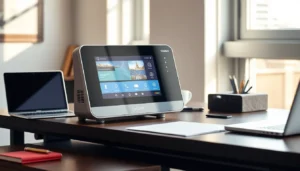In a world where shopping often feels like a scavenger hunt, retail tech solutions are the treasure maps every store needs. From smart inventory management to AI-driven customer insights, these innovative tools are transforming the retail landscape faster than you can say “checkout line.”
Imagine a store where products practically leap off the shelves into your cart, guided by data that knows your preferences better than your best friend. Retail tech isn’t just about keeping up; it’s about leaping ahead of the competition and giving customers an experience they won’t forget. With the right tech solutions, retailers can turn the mundane into the magical, ensuring shoppers leave with smiles—and maybe a few extra bags.
Table of Contents
ToggleOverview of Retail Tech Solutions
Retail tech solutions encompass a broad range of technologies designed to enhance the shopping experience and streamline operations. Smart inventory management systems provide real-time data, improving stock accuracy and reducing waste. AI-driven customer insights enable retailers to understand consumer preferences and tailor offerings accordingly.
Omnichannel retailing merges online and in-store experiences, facilitating a seamless shopping journey. Cloud-based point-of-sale systems support various payment options, simplifying transactions for customers. Mobile payment solutions allow shoppers to complete purchases quickly and securely, enhancing convenience.
Digital signage offers dynamic content to capture attention and promote products effectively. Augmented reality applications enable virtual try-ons, providing an engaging way for customers to interact with merchandise. Chatbots enhance customer service by offering instant support and driving engagement on e-commerce platforms.
Data analytics tools play a crucial role in understanding shopping behaviors and forecasting trends. They help retailers make informed decisions about promotions and inventory levels.
Adopting these technologies not only boosts efficiency but also cultivates a more enjoyable shopping environment. Retailers benefit from increased customer loyalty and satisfaction, leveraging tech solutions to foster deeper connections with consumers. By integrating innovative tools, businesses can remain competitive in a rapidly evolving retail landscape.
Key Technologies in Retail

Retail technology encompasses various tools and systems that enhance the shopping experience and improve operational efficiency. Key technologies include point of sale systems, inventory management solutions, and e-commerce platforms.
Point of Sale Systems
Modern point of sale systems streamline transaction processes, integrating sales data with inventory management. Cloud-based systems enable real-time tracking of sales, which improves accuracy in stock levels. Mobile point of sale options facilitate transactions anywhere in-store, enhancing customer service. User-friendly interfaces allow staff to assist customers quickly, reducing wait times. Features like contactless payment options make purchasing more convenient for shoppers.
Inventory Management Solutions
Effective inventory management solutions optimize stock control and reduce excess inventory, thereby increasing profitability. Automated systems track stock levels, sales patterns, and reorder points, ensuring items remain in stock. Data analytics tools enhance forecasting accuracy, helping retailers respond to demand fluctuations. Integration with point of sale systems provides real-time updates on stock levels, allowing for quick decision-making. Alerts for low stock levels ensure retailers never run out of popular items.
E-Commerce Platforms
E-commerce platforms provide retailers with the tools needed to create robust online shopping experiences. These platforms support various payment methods, ensuring convenience for customers. Customizable templates allow retailers to establish unique brand identities online. Integration with inventory management systems enables real-time stock updates, preventing overselling. Features like customer reviews and personalized recommendations enhance the shopping journey, fostering customer loyalty.
Benefits of Retail Tech Solutions
Retail tech solutions significantly enhance the shopping experience and improve operational efficiency. Their adoption leads to increased customer satisfaction and streamlined processes in the retail space.
Enhanced Customer Experience
Personalized shopping experiences arise through AI-driven insights. Retailers utilize data to tailor product recommendations, ensuring customers find what they want quickly. Instant communication with chatbots provides support 24/7, answering inquiries without delays. Additionally, augmented reality applications allow for virtual try-ons, offering a unique way to engage with products. Such innovations create a more immersive shopping environment, encouraging customers to explore and resulting in higher conversion rates.
Streamlined Operations
Operational efficiency receives a boost from smart inventory management systems. Automation of inventory tracking reduces human error and optimizes stock levels in real-time. Integrating point-of-sale data with inventory management ensures accurate sales forecasts, minimizing excess stock. Cloud-based solutions enable seamless access to important data from any location, enhancing collaboration among teams. Ultimately, these technologies improve the supply chain and empower retailers to respond swiftly to changing market demands.
Challenges Faced by Retailers
Retailers encounter various challenges while implementing tech solutions. Understanding these obstacles is crucial for maximizing the benefits of retail technology.
Integration Issues
Integrating new technology with existing systems presents a significant hurdle. Retailers often struggle to merge different software platforms and hardware components, leading to data silos. Legacy systems may lack the necessary capabilities, hindering seamless interaction. Compatibility requires thorough planning, as disruption during transitions can affect operations. Coordination between departments becomes essential, ensuring that everyone can use the new systems effectively. Training staff on new tools also demands considerable time and resources, impacting overall productivity.
Data Security Concerns
Data security remains a top priority for retailers implementing tech solutions. Cyber threats evolve constantly, putting customer information and business data at risk. Retailers must invest in robust security measures like encryption and regular audits. Compliance with regulations, such as GDPR, adds layers of complexity; failure to meet these requirements can lead to hefty fines. Establishing a culture of security awareness among employees fosters vigilance against potential breaches. Ultimately, robust cybersecurity practices protect sensitive information and strengthen customer trust.
Future Trends in Retail Tech
Emerging technologies continue to shape the future of retail by enhancing both operational efficiency and customer engagement. Retailers increasingly adopt artificial intelligence to understand consumer behavior. Machine learning algorithms analyze shopping patterns and predict trends, optimizing inventory management and product recommendations.
Moreover, augmented reality is set to transform customer experiences. Shoppers can visualize products virtually before making a purchase, which can significantly increase conversion rates. Retailers that implement AR tools create immersive environments that capture consumer attention.
Additionally, the integration of the Internet of Things stands out as a priority. Smart devices enable retailers to track inventory levels in real-time, improving stock management and reducing overstock situations. Connected devices within stores provide valuable insights into foot traffic and customer preferences.
Furthermore, cloud computing continues to gain traction among retailers. Scalable solutions facilitate data access and encourage collaboration among business teams. This flexibility enhances the ability to implement changes swiftly in response to market demands.
Data security remains a critical focus for retail tech. With increasing cyber threats, safeguarding customer information requires adopting advanced security measures. Regulatory compliance, such as GDPR, necessitates careful management of personal data to maintain consumer trust.
Lastly, the rise of mobile payment solutions cannot be overlooked. Consumers favor seamless transactions that accommodate various payment methods. Retailers adopting mobile payments enhance customer satisfaction and streamline the checkout process, driving repeat business.
Each of these trends contributes to an evolved retail landscape that emphasizes efficiency, security, and personalized experiences.
Retail tech solutions are revolutionizing how consumers interact with brands. By leveraging innovative technologies, retailers can create personalized experiences that resonate with shoppers. This not only enhances customer satisfaction but also fosters loyalty in an increasingly competitive market.
As the retail landscape continues to evolve, embracing these technologies will be crucial for success. Retailers must stay ahead of trends like AI, augmented reality, and IoT to meet changing consumer demands.
Investing in robust security measures will also be essential to protect sensitive data and maintain trust. The future of retail is bright for those who adapt and innovate, ensuring a seamless and engaging shopping experience for all.





